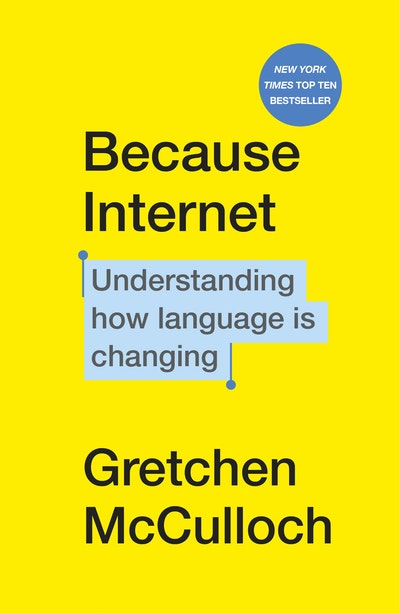- Published: 3 March 2020
- ISBN: 9781529112825
- Imprint: Vintage
- Format: Paperback
- Pages: 336
- RRP: $22.99
Because Internet
Understanding how language is changing
- Published: 3 March 2020
- ISBN: 9781529112825
- Imprint: Vintage
- Format: Paperback
- Pages: 336
- RRP: $22.99
McCulloch’s book is a good start in guiding readers to consider the wild language of the internet as a thing of wonder—a valuable feature, not a bug.
Wall Street Journal
An effervescent study of how the digital world is transfiguring English
The New Yorker
Rather than obsessing about what the internet is doing to language, [Because Internet] largely focuses on what can be learned about language from the internet. . . . McCulloch's book is about the birth of a new medium.
Economist
A well-researched retort to grumpy grammarians who think technology is turning kids into lazy, inarticulate drivelers.
Time
A compelling narrative rich with examples from her own online activities, a healthy dose of humor, and plenty of cat memes… the breadth of topics covered—from conversation analysis to meme culture to the development of texting as we now know it—makes this book useful, engaging, and enjoyable.
Science
Sometimes it seems like the internet is a seething brew of ugliness and misery. So it's nice to remember that, as well as the lawless drudgery, there are complex human systems that, intentional or not, create something totally new. Internet linguist (damn!) Gretchen McCulloch explores the ever-changing language of online.
Elle, 30 Best Books to Read this Summer
McCulloch lays out the ways in which online lingo, from emojis to GIFs to acronyms like 'lol' and 'omg,' has become a vital part of modern communication. It's also an analog window into how the evolution of digital communication mirrors the shifts in word usage that have happened over generations." —
Wired, Must-Read Books of Summer
Part Linguistics 101, part social history of the internet, Because Internet revels in digital language deconstruction, exploring not just the evolving language of online informal…More importantly, she doesn’t just appreciate internet language, she celebrates it.
The Ringer
Gretchen McCulloch's Because Internet is not your English teacher's grammar guide—not even close. Self-described internet linguist McCulloch traces how the web has changed the way we communicate—whether through emoji, lowercase letters. or cat memes—and makes a compelling, entertaining argument that this change is good for the English language as a whole.
Real Simple
Gretchen McCulloch is the internet’s favorite linguist, and this book is essential reading. Reading her work is like suddenly being able to see the matrix. She explains the hows and the whys of the ways we talk online with the deepest empathy, understanding, and compassion.
Jonny Sun
In prose at once scholarly and user-friendly, McCulloch unpacks the evolution of language in the digital age, providing a comprehensive survey of everything from the secret language of emojis to the appeal of animal memes.
Esquire
We know lols, emojis and hashtags are altering our discourse. Linguist McCulloch counts—and revels in—the ways. Give it to your favorite stickler.
People
Because Internet is the most up-to-date and comprehensive guide to the way informal internet language has evolved and is evolving. Its historical perspective will illuminate every generation of internet users: oldies will get a clear picture of what young people are up to; younglings will discover the origins of their latest linguistic fashions. Gretchen McCulloch writes with great common sense, an eye for the apt illustration, an appealing sense of humour, and a real concern for explanation. She doesn't just describe language trends: she investigates why they've taken place, and it's her insightful interpretations that give this book its special appeal.
David Crystal
Covers the backstory of how tildes became the punctuation mark for ~whimsy and sarcasm~...and when we started repeating certainnnnn lettersssssssss for emphasis
Buzzfeed
McCulloch is such a disarming writer - lucid, friendly, unequivocally excited about her subject
New York Times
Because Internet sheds light on so many things…about how people use text to communicate
Randall Munroe, New Scientist
McCulloch offers a compelling snapshot of a world in flux, from which readers will learn a lot about language, the internet and themselves
Financial Times
McCulloch offers a compelling snapshot of a world in flux, from which readers will learn a lot about language, the internet and themselves
Financial Times
Because Internet…illustrates how many of us feel about English in the online age… It is hard not to be moved by her McCulloch is an engaging writer who clearly adores her subject
Sunday Times
A fascinating analysis
Observer
McCulloch’s subject is an under-explored one, and Because Internet demonstrates that it is one of interest to a wide readership… she shows, in a delightfully accessible way, how internet language can offer valuable insights for linguistic research
Anna Hollingsworth, Times Literary Supplement




